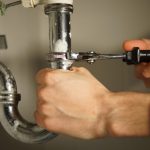You are well aware that water is a necessary part of life. But only because you need water to live, does not mean that your home needs it as well. In fact, water anywhere in or around your home can be a serious problem with costly consequences. You might believe that a small bit of water is no big thing. While a small spill is not anything to be concerned about, a burst water pipe, flooded basement, or leaky roof can cost you a lot of money. How much exactly? Here are a few things you should know:
A flooded cellar will cost anywhere from $500 to $10,000 to dry and fix. Factors that contribute to cost include the dimensions of the basement, the severity of the flood, and also the length of time the basement was flooded.
Homeowners or flood insurance will often cover water damage costs but not necessarily the full amount (and it is dependent on the cause too).
What do you do to protect your home and prevent problems in the first location? With a few cautious additions, steps, and prevention procedures, many homeowners may all but eliminate the danger of water damage ruining your house.
One of the most important things you can do to prevent water damage and help you save money is to be conscious of your house environment and stay informed about what’s around you. Just what does that mean? Here are a couple of things you should understand:
- Know how old your home is, what the pipes are constructed of, and what type of issues usually plague homes just like yours. If you live in an older home it is important to know what the pipes are made of (you can get that out by calling plumbing assistance, asking the former homeowner, or hiring a contractor). You will find many pipe materials used in old and new houses, and some are more prone to leaks than others.
- Be aware of your climate. Can you live someplace cold and snowy? If that’s the case, you may have to insulate your pipes throughout the winter. As stated above, a burst pipe can cost thousands of dollars to fix. But don’t believe the only pipes you want to be concerned about are the vulnerable ones; even pipes beneath your home, in your garage, or even near outer walls may freeze. Luckily, all it requires is a bit of foam insulation to prevent most problems.
- Being conscious of the weather issues are common in your area. Weather is maybe the biggest factor you want to consider when preventing water damage. Make sure you understand what to expect and take certain steps to guard your property.
- Look over your water bill every month and listen to odd fluctuations. If you discover you’re paying more than you should, it may indicate a flow. Any harm to your roof may lead to serious problems throughout the rest of your property. If you can not see your roof or are incapable of climbing on it, call a roofing firm for assistance.
SPRINKLER SYSTEMS
Damaged sprinkler systems are a major cause of lawn and basement floods around the nation. It’s common for sprinklers to wear over time and with frequent use, eventually leading to leaks. And in regions that drop below freezing during the winter, broken or burst pipes are even more prevalent. If your town melts the water to your irrigation systems every autumn, make sure you know when they’ll turn the water back on. Once you know when the water is going to be turned on in the spring, spend a couple of days after they do so watching your lawn for any soggy, damp, or unusually spongy places. If you become aware of any excess water, then you’ll have to fix the damage immediately. If the primary water line doesn’t leak, turn your irrigation system on and watch for the very same signs of damage. If the sprinklers appear to be operating poorly or with reduced pressure, there could be a leak somewhere in the computer system.
FIXING THE DAMAGE
We can help you fix and fix whatever might be causing water damage throughout your home. While we’re more than happy to help get your life back on track, preventing water damage is always better than fixing it. But we know that life occurs and a few problems simply can’t be stopped. If that is the case, you need to act fast to save your home and belongings. The first thing you have to do if you’ve got a leak or to prevent more water damage would be to turn off the water throughout your home. The longer you leave it on, the greater the damage will be. If the flood is caused by Mother Nature, consider placing sandbags and other dams around your home as an alternative. Once the water is away (or so the flow is redirected) make sure that you turn the power off during your property. It’s quite easy to electrocute yourself during a flood should you keep the power on. Following the water and electricity are away, remove all your belongings and furniture as quickly as possible. You will have to dry and fix furniture and electronics, but a lot of it may be uninstalled if you act fast. If the water subsides or dries on its own, you’ll need to wash any moist surfaces to prevent mold, mold, and bacteria from growing. Avoid using direct or high heat, as that may ruin fabrics and warp most materials. Once you have done your best and when there is still water in your home, it’s time to seek out professional assistance. Like we mentioned before, we are prepared with all the tools and experience you want when you want us if you can not do it all on your own.
Keeping your home safe from water damage from the inside is also crucial. Have a look at the best way to secure your home from water damage. Has your house suffered damages after a recent storm? Learn how to handle water and storm damage. For professional water damage clean up mold or repair removal support, speak to your regional PuroClean St Augustine office.




